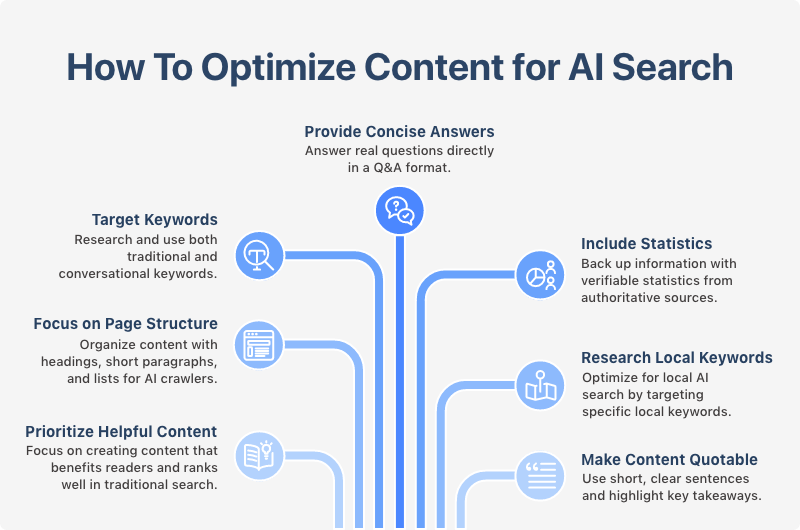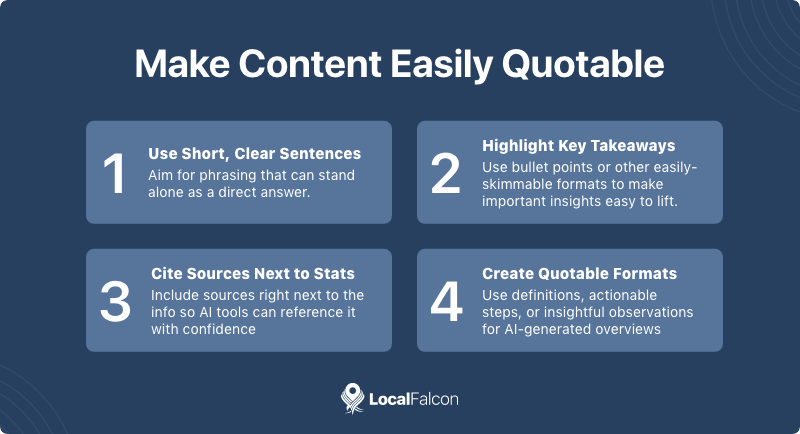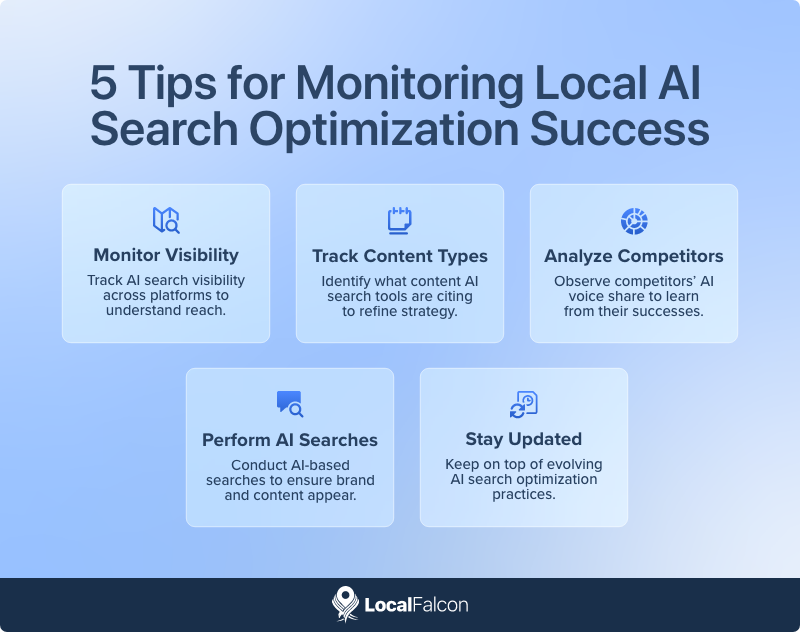AI and search are now synonymous, with AI search tools accounting for a larger share of overall search traffic every day. Instead of simply showing users a ranked list of blue links, these platforms generate direct, citation-driven answers that can either put your brand in the spotlight or leave you off stage.
This is why it's so important for businesses and SEO professionals to implement best practices for AI search optimization in 2025 and beyond, keeping in mind that this is a rapidly evolving branch of SEO that is prone to change in real time.
That being said, many of the same best practices can work for both traditional and AI search optimization, and focusing on these can help future-proof your SEO strategy and increase visibility in the AI era.
7 AI Search Optimization Best Practices To Start Implementing Today

1. Prioritize Helpful, Authoritative Content
Just as Google values E-E-A-T (Expertise, Experience, Authoritativeness, Trustworthiness) for traditional search rankings, AI search tools value helpful, authoritative content when generating summarized answers from multiple sources.
In this sense, if you're already creating content that ranks well in traditional search engines, it has a good chance of getting surfaced by AI as well.
However, if your content isn't up to par in terms of being actually helpful, now's the time to shift gears and start focusing on publishing content that can really benefit readers, rather than publishing a high volume of mediocre, keyword-stuffed pieces.
2. Focus on Page Structure More Than Ever
Just like traditional search algorithms (which are, in fact, AI-driven themselves), AI search platforms rely heavily on page structure elements to evaluate the relevance of content to a user's search query.
This means it's more important than ever to organize web pages and blog posts well, using headings (H1, H2s, H3s), short paragraphs, bulleted/numbered lists, tables, and other structure elements to make it super easy for AI crawlers to understand your content.
3. Target Both Traditional and Conversational Keywords
Despite cries that "traditional SEO is dead" (which have been going on for years, by the way), keyword research is still relevant in the AI era.
It's important to conduct comprehensive keyword research to generate targeted lists of both traditional search and conversational AI search keywords, then structure content around these keywords. This will increase your content's chances of getting ranked in traditional organic search results as well as AI-generated answers and overviews.
One key difference to understand when it comes to keyword targeting in the AI era is that the types of conversational queries that users are using for AI search won't usually appear in traditional keyword tools, since they don't typically have high enough search volumes. So, you'll need to use a mix of techniques and tools to discover more long-tail keywords that your potential customers are using to prompt AI.
For example, local businesses can use Local Falcon's AI-powered keyword research tool to instantly generate lists of hyperlocally relevant keywords for both traditional and AI search, based on location and industry. These lists show you the search intent and AI reasoning behind each keyword suggestion, making it easier than ever to craft content that potential customers will find helpful and that AI search engines will be more likely to refer to and cite.
4. Provide Concise Answers To Real Questions
Rather than simply matching content to keywords and organizing it in ranked lists of URLs, AI is focused on providing real answers. This means, as a business or SEO professional, you need to focus on answering real questions that potential customers have.
The best way to do this is to structure content in a question-and-answer format, using headings for questions and short paragraphs for answers. You can do this in blog posts, making sure to avoid adding extra fluff just for the sake of expanding the word count. Another great place to do this is in FAQ sections, which can either be dedicated pages or added to existing landing pages and blog posts (or both).
In short, the more direct and intentional you are about providing real answers to real questions, the more likely AI search tools are to surface those answers in aggregated responses and overviews.
5. Include Relevant Statistics
AI search engines love to cite statistics. So, instead of making generalized statements, back up information with relevant stats in your content wherever possible. These numbers should be easily verifiable and come from authoritative sources (think .edu and .gov sites, Statista, Gallup, etc.).
6. Research Local AI Search Keywords Specific To Your Industry
For local businesses, it's important to optimize for AI search engines by targeting locally relevant AI search keywords in addition to broader terms.
However, as we touched on earlier, many traditional keyword research tools focus on high-volume keywords and national-level data.
This is where using Local Falcon's Local Keyword Tool can be a huge game changer. Simply choose a business location from a connected Google Account (or type in any location manually), select a seed keyword, and get a list of AI search keywords tailored to your specific area and industry.
For instance, let's say you're doing AI search optimization for a roofing contractor in Chicago's Lincoln Park neighborhood and want to increase AI search visibility for roof-repair-related keywords. You might get ideas of AI search queries like:
- "Who fixes leaky roofs fast in Lincoln Park Chicago?"
- "Can I get same day roof repair in Lincoln Park Chicago?"
- "How to spot roof damage after a storm in Lincoln Park Chicago"
These would all be great conversational search queries to use in headings and FAQs, so you can provide exactly the types of well-structured, concise answers that AI favors in local responses.

7. Make Content Easily Quotable
AI search engines are constantly scanning for sentences, stats, and phrasing they can pull directly into summaries and responses. If your content is hard to quote, meaning buried in long paragraphs, vague, or overly wordy, it's less likely to be cited.
To increase the chances of being quoted, use short, clear sentences. Aim for phrasing that can stand alone as a direct answer.
Highlight key takeaways using bullet points or other easily-skimmable formats to make important insights easy to lift.
If you cite a study, include the source right next to the statistic so AI tools can reference it with confidence.
Create quotable formats (think "statements worth repeating"), such as concise definitions, actionable steps, or insightful observations that can be dropped into an AI-generated overview without editing.
The more quotable your content is, the higher the likelihood that AI platforms will use it, and when they do, they'll often display your brand as the source, giving you visibility right where your audience is searching.
FAQs About Best Practices for AI Search Optimization in 2025
Are AI Search Engine Optimization Best Practices the Same as Traditional SEO Best Practices?
Think of AI search engine optimization best practices as building on traditional SEO principles. Many of the same strategies, such as creating highly structured content, focusing on E-E-A-T, and targeting the right mix of short- and long-tail keywords can work for both traditional and AI search engine optimization.
How Do I Find Conversational Keywords for AI Search?
Traditional keyword tools often miss the extra-long-tail, natural language queries people use when prompting AI tools. To uncover conversational keywords, use AI-driven keyword research platforms, analyze customer questions, and review search console data for queries phrased as questions.
Why Does Page Structure Matter More in AI Search?
AI search engines look for content they can easily parse and cite. Well-structured content makes it easier for AI tools to understand context and pull clean, quotable snippets into answers.
How Can Local Businesses Optimize for AI Search?
Local businesses should focus on hyperlocal, conversational queries that customers might use in AI tools. Including FAQs and locally targeted landing pages increases the chances of being cited in local AI-driven responses.
What Types of Content Are Most Likely To Be Quoted by AI?
Concise answers, statistics, definitions, and step-by-step instructions are among the most quotable content types. Formatting content so these takeaways are easy to lift can increase visibility in AI-generated summaries and answers.
Does AI Search Replace Traditional SEO in 2025?
No, traditional SEO is still critical for organic visibility, but AI search is changing how users interact with information. Businesses that adapt their content for both will gain an advantage over competitors who ignore AI search optimization best practices.
What's the Biggest Mistake to Avoid in AI Search Optimization?
The biggest mistake is treating AI optimization as a completely separate strategy and neglecting fundamentals. Classic SEO pitfalls, such as keyword stuffing, publishing low-value content (especially straight copy-pasted AI content), and failing to structure information clearly and authoritatively will ultimately hurt both traditional SEO and AI visibility.

Quick Tips for Monitoring Local AI Search Optimization Success:
- Monitor your local AI search visibility across multiple platforms in Local Falcon.
- Keep track of which types of content AI search tools are citing in your area.
- Don't forget to track competitors' Share of AI Voice to see what's working for them.
- Perform AI-based searches for conversational queries and see if your brand and/or content appears.
- Keep in mind that AI search optimization best practices are quickly evolving, and what works today might change tomorrow.


